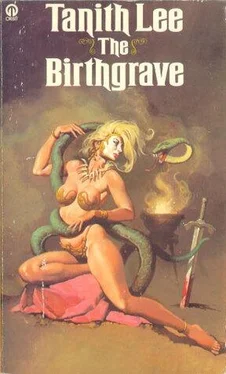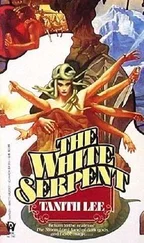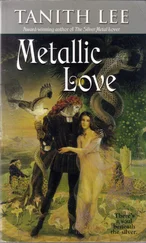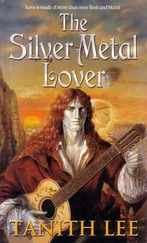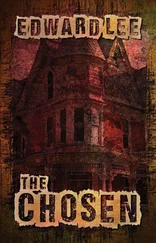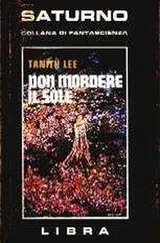Tanith Lee - The Birthgrave
Здесь есть возможность читать онлайн «Tanith Lee - The Birthgrave» весь текст электронной книги совершенно бесплатно (целиком полную версию без сокращений). В некоторых случаях можно слушать аудио, скачать через торрент в формате fb2 и присутствует краткое содержание. Год выпуска: 1977, ISBN: 1977, Издательство: Orbit, Жанр: Фэнтези, на английском языке. Описание произведения, (предисловие) а так же отзывы посетителей доступны на портале библиотеки ЛибКат.
- Название:The Birthgrave
- Автор:
- Издательство:Orbit
- Жанр:
- Год:1977
- ISBN:0-86007-942-2
- Рейтинг книги:3 / 5. Голосов: 1
-
Избранное:Добавить в избранное
- Отзывы:
-
Ваша оценка:
- 60
- 1
- 2
- 3
- 4
- 5
The Birthgrave: краткое содержание, описание и аннотация
Предлагаем к чтению аннотацию, описание, краткое содержание или предисловие (зависит от того, что написал сам автор книги «The Birthgrave»). Если вы не нашли необходимую информацию о книге — напишите в комментариях, мы постараемся отыскать её.
The Birthgrave — читать онлайн бесплатно полную книгу (весь текст) целиком
Ниже представлен текст книги, разбитый по страницам. Система сохранения места последней прочитанной страницы, позволяет с удобством читать онлайн бесплатно книгу «The Birthgrave», без необходимости каждый раз заново искать на чём Вы остановились. Поставьте закладку, и сможете в любой момент перейти на страницу, на которой закончили чтение.
Интервал:
Закладка:
“You had a death-wish and a wish to live,” he said. “That’s common to all men. Unfortunately you had the power to organize both.”
“And Darak’s death in Ankurum. Did I make it happen?”
“I don’t think so,” he said, and I wanted to believe him. “You were convinced there was a curse on you, that there could be no happiness for you or for anyone you loved. That conviction communicated itself both to Darak and Vazkor, but not directly through you, because you never spoke to them of it.”
But I recalled how I had said to Darak, “To see my face is death to you.”
I wanted to believe him. I thrust the memory of Darak away, and the memory of Asutoo, the warrior I had hypnotized and murdered for revenge.
“The Mountain Ring,” I said, “and Uasti. My mental strength grew because of her. I thought she was teaching me new things, instead of releasing abilities I already possessed.”
“Uasti was a good teacher,” he said. “She made you look a little way into yourself, see what you could become. She might have taught you restraint, if she’d lived.”
“But she died. I ruled the wagoners, and crossed the Water. I was killed, and healed, and lived, and reached Ezlann. And Vazkor.”
“Vazkor,” Rarm said. “One of your worst teachers. In order to match him, you grew like him. You achieved the hubris Sekish had made you fear for yourself. And even before Ezlann, you killed the wagoners on the road.”
“I have always thought,” I said, “their death was my worst crime, even out of all the crimes and cruelties I committed.”
“Don’t judge yourself,” he said. “None of us are ever good at it. I think, at that time, to yourself you were already a goddess. Before, you had always thought you could die, yet you rose from the grave—only gods do that. In the City you unconsciously exerted influence to draw three guards to you—as you had unwittingly done in the bandits’ camp.”
“Because part of me recalled the three guards in the tomb paintings, the symbol of Temporal Power. As I recalled the symbolic knife, and thought it could kill me.”
“Exactly,” he said.
“In Ezlann and the Cities, the flame I called Karrakaz was still. It never troubled me. And in Belhannor, to raise the storm, I made a union with the flame—”
“In the first place, the flame left you alone because you were finally too strong—too strong even for the self-terror Sekish had given you. You’d faced yourself, you had said: ‘I am everything I was afraid to be. There’s no help for what I am. I can do nothing about it. Therefore I shall enjoy and reap benefit from my superior status, and crush the ants under my heel.’ In Belhannor there was no link —you simply drew on the extra reserves of Power now open to you without their self-inflicted barriers. You were Uastis, the Risen One, the goddess of White Desert. And finally you set your strength against Vazkor—in contempt, because he had no right to share your hubris.”
“I killed him,” I whispered to my white, half-opened hands.
“You killed him,” Rarm repeated. “And then you lay down to die under the tower.”
“And when the tribe found me my Power was gone. I could not even understand their tongue, let alone kill their seer.”
“Which was your final punishment against yourself. You had seen yourself achieve Power. You had fulfilled Sekish’s assessment of you. So now you blocked your Powers totally, and let the cruelty of the tribe complete your chastisement. You suffered, but you needed and wanted to suffer. When you were treated as a useless woman, a fool and a slave, it was the action of the princes and princesses under the mountain, beating themselves into miserable humility. You left your child as much because it would hurt you, as because it was expedient. And finally you became an animal in the marshes, shut off from all rational contact with man.”
“Until the black tribe took me in,” I said.
“And the striving began again,” Rarm said. “The peace, and then the Book—one of those diaries of repentance you were given as a child—recalled your quest for the Jade. You went to the ruined cities on the shore, and there you found Karrakaz, as you knew you would, because part of your mind recognized the structure of a tomb, and where the offering cup would be.”
“I tried to destroy myself completely,” I said. “A sleep of death I had willed on myself. It was not a demon I fought, only myself. Yet, so terrible. So real to me. No surprise now that Fethlin was able to save me. The Power was directed only at me—until we reached the valley. Did I cause the earth quake there as at Kee-ool?”
“Yes. You’ve always been able to harness great elemental forces for your own suppression.”
“The dream,” I said, “the dark deserted city, and the red fire on the tongue of land in the bay. A pyre,” I said. “The Plague had come for them too. And then the lizard. And then, on the beach, the shadow of the ship, and the beam of light—”
“You brought us down,” he said, “and you used the computer to kill the lizard. One of your few actions of self preservation.” “Why?”
“Perhaps,” he said, smiling, “perhaps in some way you knew all this would follow. You have, after all, the gift of foreknowledge also.” There was another little silence between us in the room.
He said, “All your Powers have returned now. For example, we’ve communicated all this time with no trouble.”
“The wrist-band,” I said. But when I looked down the green light did not sparkle. I drew it from my wrist. I said, “I understand now, but I am not complete. I have had one year of life since my childhood.
But I made certain that when I was reborn, I would be born dead.”
He rose.
“You’re still dead,” he said to me, and I understood him very well. He came and lifted me until I stood facing him. “You haven’t yet found the Jade.”
I turned away.
“Of that last thing, I am afraid.”
“You know the answer. As a child you knew. As a woman, you made yourself forget. There’s only one way for you to be free.”
With a slight breath of sound, the silvery ice of a mirror slid from the wall in front of us. It stood before me like an invulnerable guard, blocking my last way of escape. In it I saw our reflections, a dark man, a pale woman with a covered emptiness of a face.
“Before I took you to the computer to learn the truth of all this,” he said, “the part of you which you called Karrakaz paralyzed and blinded you to prevent your going. Now you’ve destroyed that assassin, and there’s no longer any way you can hide from reality.” He paused. He set me in front of him, before the gleaming cruel mirror. “Take off the mask,” he said.
My hands rose a little way, faltered, fell back.
He held me still.
“Take off the mask.”
My hands moved to my neck, upward to my hairline where the black forehead of the shireen ended. My hands froze and stiffened and would not do anything else.
“I cannot,” I said. “The ugliness—like a beast—”
“The Jade,” he said. “ The Jade.”
“Yes,” I said. I screamed at the reflection as if it now were my enemy. I ripped and tore the shireen free of my skin, and my skin breathed, the air struck like snow on the flesh of my face. But I could not bear to look at what gaped before me. I covered my face with my hands.
I was crouching low against the floor, one arm over my head, my chin pressed down against my breasts.
“No,” he said. Kneeling behind me, he peeled my fingers from my face, and when I replaced them with my other hand, he took that away also. He held my hands to my sides. His face was against mine as I tried to bury it in my breast. “Look up,” he said. “Look up.” There was something in his voice—part laughter, part bitter sadness. I raised my head a little way, though not far enough to see. “Look up,” he said to me. Gently he put his hand under my chin and lifted it, and now I looked into the mirror.
Читать дальшеИнтервал:
Закладка:
Похожие книги на «The Birthgrave»
Представляем Вашему вниманию похожие книги на «The Birthgrave» списком для выбора. Мы отобрали схожую по названию и смыслу литературу в надежде предоставить читателям больше вариантов отыскать новые, интересные, ещё непрочитанные произведения.
Обсуждение, отзывы о книге «The Birthgrave» и просто собственные мнения читателей. Оставьте ваши комментарии, напишите, что Вы думаете о произведении, его смысле или главных героях. Укажите что конкретно понравилось, а что нет, и почему Вы так считаете.
